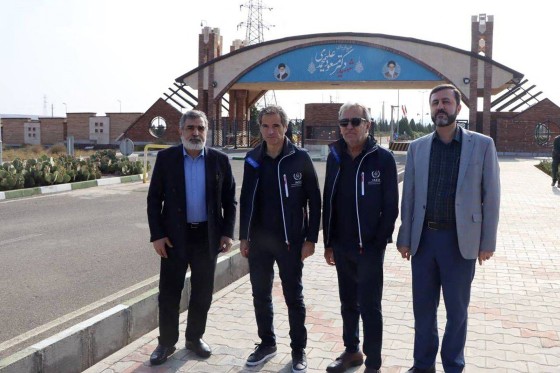
ViennaThe 35-nation Board of Governors, the U.N. atomic watchdog, passed a resolution on Thursday urging Iran to immediately strengthen its cooperation with the organization and calling for a thorough report to put pressure on Iran to engage in new nuclear negotiations.
The resolution’s proposers, Britain, France, Germany, and the United States, rejected an Iranian last-minute attempt to curb its store of nearly weapons-grade uranium as insufficient and dishonest. According to diplomats, Iran’s action was contingent on the resolution being abandoned.
Iran has stated that it would retaliate in kind to this resolution, which it often finds offensive. It has increased its nuclear activity and decreased IAEA control following earlier criticism at the International Atomic Energy Agency’s Board of Directors.
According to officials at the meeting, China, Russia, and Burkina Faso voted against the document. Twelve nations abstained, while 19 voted in favor.
Iran and the IAEA have been at odds for a long time over a number of issues, such as Tehran’s refusal to increase IAEA monitoring, its exclusion of the majority of the agency’s top uranium-enrichment experts from the Iran inspection team last year, and its inability to provide an explanation for uranium traces discovered at unreported sites.
A November 2022 decision that stated that Iran must immediately and urgently explain the uranium traces and allow the IAEA to take samples if needed was reiterated in the resolution seen by Reuters. This year’s June resolve followed suit.
A thorough and updated assessment of the potential existence or use of undeclared nuclear material in relation to past and current unresolved issues regarding Iran’s nuclear program, including a detailed account of Iran’s cooperation with the IAEA on these issues, was requested in the new text.
Western nations anticipate that the report, which is due in the spring of 2025, will put pressure on Iran to engage in negotiations on new nuclear limitations, albeit less extensive than those included in a 2015 agreement with major powers that fell apart after the United States withdrew from it in 2018.
It is unclear if Trump would support talks to set new restrictions before the 2015 deal’s ones are lifted on termination day in October of next year, given that he is scheduled to return to office in January and Iran has significantly increased its uranium enrichment above the deal’s limits.
The report might be used to support the so-called snapback, a procedure under the 2015 agreement where the matter is brought before the U.N. Security Council and sanctions lifted under the agreement can be reinstated, if no new restrictions are agreed upon before then.
Rafael Grossi, the head of the IAEA, traveled to Tehran last week in an attempt to persuade Masoud Pezeshkian, the country’s new president and a perceived moderate, to strengthen Iran’s collaboration with the agency.
Grossi formally informed member states on Tuesday that the IAEA had confirmed Iran had started implementing preparatory steps and that he had discussed with Iranian authorities the possibility of Iran not increasing its stockpile of uranium enriched up to 60% U-235.
According to an IAEA yardstick, Iran already possesses enough material enriched to that level, which is over 90% pure and weapons grade, for four nuclear bombs if further enriched. Iran denies pursuing nuclear weapons, but it does have enough material enriched to lower levels for more bombs.
Grossi said on Wednesday that Iran has agreed to his request to cap that 60% material stock.
He indicated that he believed a resolution may undo that accomplishment when he told a news conference that day that it was a tangible step in the right direction.
Iran will probably react after the resolution is passed.
Iranian state media, quoting a joint statement from the foreign ministry and the Atomic Energy Organization of Iran, reported shortly after the vote that Iran’s nuclear leader, Mohammad Eslami, had ordered actions such as turning on a number of new and sophisticated centrifuges, which are devices that enrich uranium.
Prior to the vote, a senior diplomat stated that Iran would either expand its operations or limit the agency’s access if a resolution is passed.
Note: Every piece of content is rigorously reviewed by our team of experienced writers and editors to ensure its accuracy. Our writers use credible sources and adhere to strict fact-checking protocols to verify all claims and data before publication. If an error is identified, we promptly correct it and strive for transparency in all updates, feel free to reach out to us via email. We appreciate your trust and support!
